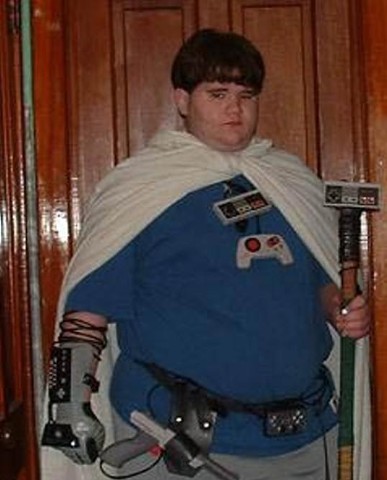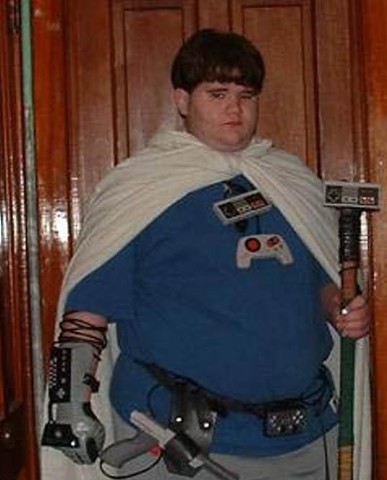Editor’s note: Pete provides an interesting take on the split between different types of gamers. I personally beat many of the classic Commodore 64 games he mentions, and I agree that game design has changed a lot since then. However, I wonder how much of that old-time patience was born out of lack of better alternatives. -Jay
 Gamers are lazy, right? They sit on their asses while staring at TV screens all day, not moving except for occasional toilet breaks and to shovel pizza into their mouths. Well, of course some gamers fall into that category, as do some members of other groups. Film buffs, book enthusiasts, and audiophiles all count lazy people among their ranks.
Gamers are lazy, right? They sit on their asses while staring at TV screens all day, not moving except for occasional toilet breaks and to shovel pizza into their mouths. Well, of course some gamers fall into that category, as do some members of other groups. Film buffs, book enthusiasts, and audiophiles all count lazy people among their ranks.
In recent years though, there’s a different type of laziness forming in certain circles, and it’s starting to form a big divide: a large number of gamers are simply losing patience and seeking the easier and speedier rewards of casual games.
Back in the early days of gaming, most video games were two things: short and brutal. If you knew what you were doing in a typical game on the Commodore 64, you could probably breeze through it in less than an hour.
“Pish!” you may say. “Short games suck! Except Portal. Everyone loves that. But, in general, short games suck! Boo!”
Well now, here’s the thing: these games, while they were short on content, were actually so challenging that it was entirely plausible that, in weeks and weeks of playing, you’d never see the end credits. This meant a lot of repeating the same part, getting a little bit better each time, and finally making some progress. The ultimate reward in those days was the chance to get on to a new screen or a level with a different color palette.
 Video games taught me patience and perseverance. While I never beat something like Pitfall as a kid, I appreciated that if I wanted to beat it, I would have to sit down and practice. Contrast this with a lot of games today, where your hand is held so much that it’s difficult to fail at the game – it’s more a test of endurance.
Video games taught me patience and perseverance. While I never beat something like Pitfall as a kid, I appreciated that if I wanted to beat it, I would have to sit down and practice. Contrast this with a lot of games today, where your hand is held so much that it’s difficult to fail at the game – it’s more a test of endurance.
This isn’t necessarily a bad thing. In narrative-heavy games, who wants to spend hours hearing the same bit of dialogue over and over again because you keep dying right after a big monologue? I certainly don’t. This is one of the reasons I gave up on Gears of War. So why not give the player a bit of help to see the next piece of the story?
There’s a popular theory about The Legend of Zelda: Twilight Princess that says the team who worked on it back-loaded so much awesome content and many people became bored and switched to another game before they got to the end. This means that only an estimated 10% of people who bought the game actually saw said awesomeness and completed it. Compare this to Uncharted 2, a much shorter game in which the vast majority of people who started it also finished it. Patience is finite for a lot of people in these modern days – even more so in the case of people towards the younger end of the spectrum. Look at how many people type “cba” instead of “can’t be arsed” or “idk” instead of “I don’t know” or “lol” instead of any piece of punctuation.
Casual games’ explosion in popularity can be attributed to many things, but one of those things is the instant gratification they provide. Many of them are also connected to Facebook and Twitter, which means that you can broadcast every tiny little thing you achieve to everyone on your friends list. You leveled up in Mafia Wars! Well done. You can click on a button. You reached Company Mastery in Band of Heroes! Well done. You can click on a different button. You won a 250k medal in Bejeweled Blitz! Well done, you inhuman freak. There are achievements every few seconds, very few of which you have to work for.
 This is where the divide comes in. This split between casual and hardcore gamers is not one about which group calls people names the most — there’s plenty of that on both sides, sadly. Nor does it have anything to do with skill, or the amount of time you’ve spent immersing yourself in video games. The dividing factor is patience. A hardcore gamer will happily sit down with something like Demon’s Souls and repeat the same area over and over again until he perfects it, while a casual gamer will die once and never go back to it because it’s too hard.
This is where the divide comes in. This split between casual and hardcore gamers is not one about which group calls people names the most — there’s plenty of that on both sides, sadly. Nor does it have anything to do with skill, or the amount of time you’ve spent immersing yourself in video games. The dividing factor is patience. A hardcore gamer will happily sit down with something like Demon’s Souls and repeat the same area over and over again until he perfects it, while a casual gamer will die once and never go back to it because it’s too hard.
There’s nothing wrong with that, though. Sometimes we just want to kick back, relax, and switch our brains and reflexes off for a bit.
That doesn’t mean, however, that there isn’t a place for hardcore, challenging games. If anything, the broad spectrum of effort required for the wildly different types of games that exist now widens the appeal of gaming well outside of its original audience. A quick glance at how many people are spamming my Facebook news feed with FarmVille proves this.



